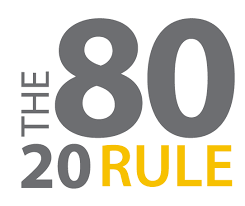Have you ever noticed that majority college students (at least in my course) start studying 20-30 days before the semester exams rather than studying for the whole semester? Or the fact that before being banned, Maggie held a 90% share in the Indian noodle market. Now, think of these situations from a more generalized perspective. Yes, the concept is as interesting as the name itself.
The 80-20 Rule, also known as Pareto’s Law, The Principle of Least Effort or The Principle of the Vital Few, states that 80% of the output is obtained from 20% of the input. This proportion may not be exact in every situation but the overall deviation would generally remain close to the 80:20 ratio.
This principle was discovered and explained mathematically by Vilfredo Pareto, an Italian economist and sociologist during a study of unequal wealth distribution in Italy. In the 1940s, Dr. Joseph M. Juran, attributed the 80/20 Rule to Pareto and called it Pareto’s Principle.
It is generally applied in the fields of career change/business start ups, planning, decision making, selling, marketing, project management, leadership, change management and personal change.
The main advantage of this rule is that organizations have now understood that the easiest way to maximize their profits is by focusing their attention on 20% of the most necessary tasks/products/services, etc. It leads to the conservation of resources, efforts and time. But at the same time it is important that managers apply this law wisely and with precaution. In a situation where focusing 80% attention on the best 20% would lead to less benefit as compared to focusing the same attention on the less productive 80% so that it leads to greater profits, the latter must be preferred.
Therefore, I would end by saying that Management is a situation oriented science and the judicious use of such laws can create a better world.
 Stay Ahead with the Power of Upskilling - Invest in Yourself!
Stay Ahead with the Power of Upskilling - Invest in Yourself! 





20 Comments. Leave new
interesting article 🙂
well written
Quite intriguing!Got to learn something new!
Well Researched one 😀
GOod work 😀
Quite a different topic. Very well written
nice
Very important for case studies.
You helped me in understanding about pareto. Thank you ?
Great article!
Nice piece of writing.
Now this is something unique. I didn’t know about this concept before.
Great work
Great work
Interesting!!
this is SO interesting!
Great efforts
informative and presented in a nice way 🙂
Informative. Good job!
very well presented Saumya 🙂
well articulated too!!!
Didnt have much idea about it. Really informative. Thanks. !!!!